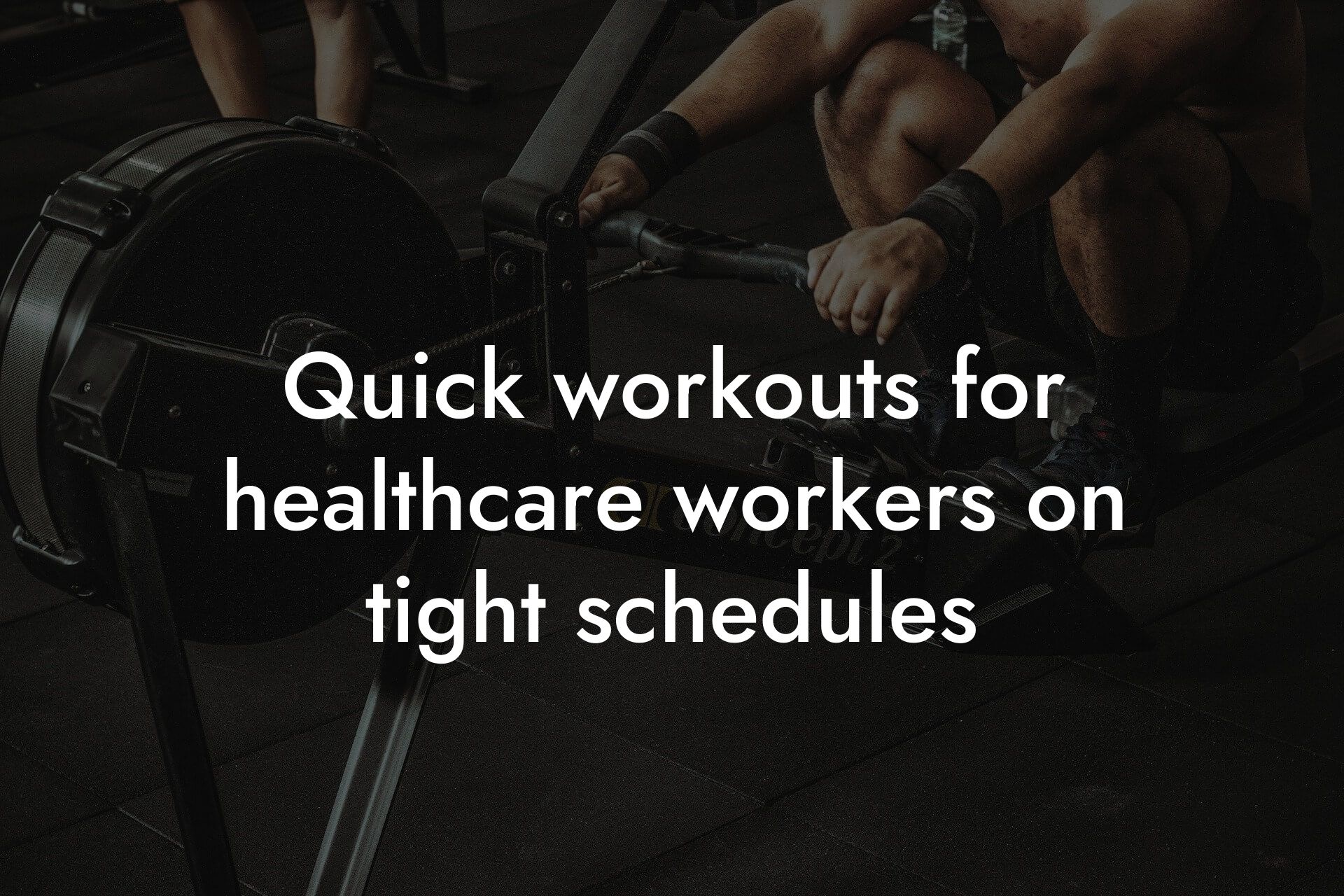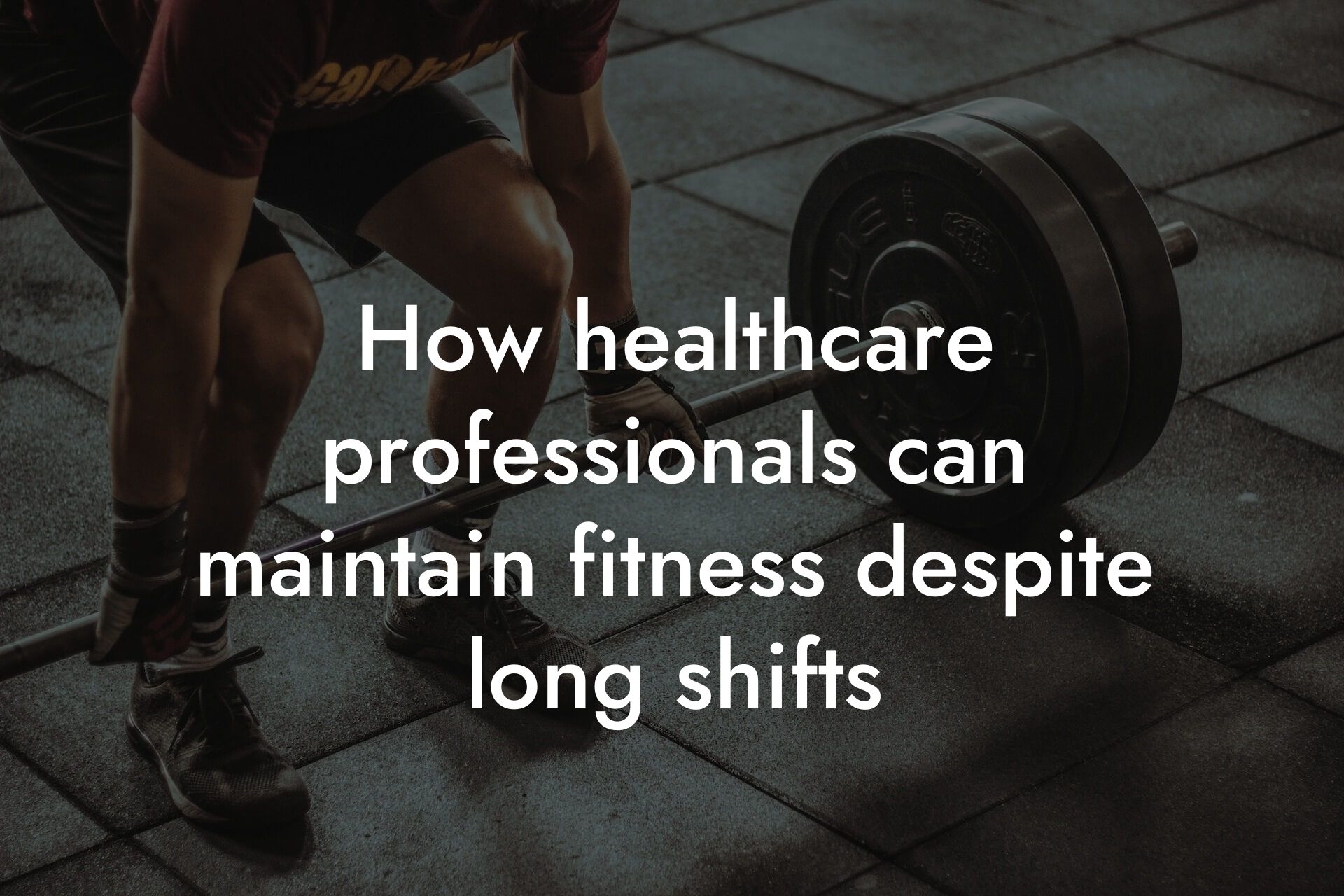Healthcare workers are the backbone of our healthcare system, providing essential care and services to patients in need. However, the demands of their job can take a significant toll on their physical and mental well-being, leading to burnout. Burnout is a state of emotional, mental, and physical exhaustion caused by prolonged stress, overwork, and lack of balance in life. It can result in decreased productivity, poor job satisfaction, and increased turnover rates. In this article, we will explore the importance of fitness in preventing healthcare worker burnout and provide valuable insights on how to prioritize physical activity in the demanding world of healthcare.
Table of Contents
- The Prevalence of Burnout in Healthcare Workers
- The Physical and Mental Demands of Healthcare Work
- The Role of Fitness in Reducing Burnout
- Benefits of Exercise for Healthcare Workers
- Challenges to Prioritizing Fitness in Healthcare Workers
- Strategies for Prioritizing Fitness in Healthcare Workers
- Frequently Asked Questions
The Prevalence of Burnout in Healthcare Workers
Burnout is a pervasive issue in the healthcare industry, affecting up to 70% of healthcare workers. The World Health Organization (WHO) has recognized burnout as an occupational phenomenon, acknowledging its impact on the well-being and performance of healthcare professionals. The consequences of burnout can be severe, including decreased patient satisfaction, medical errors, and a higher risk of depression and anxiety.
The Physical and Mental Demands of Healthcare Work
Healthcare work is physically and mentally demanding, requiring long hours, heavy lifting, and high levels of concentration. Healthcare workers often work in high-stress environments, managing complex patient cases, dealing with life-or-death situations, and coping with the emotional toll of patient suffering. The cumulative effect of these demands can lead to physical exhaustion, muscle strain, and mental fatigue.
The Role of Fitness in Reducing Burnout
Regular physical activity is a potent antidote to burnout, offering numerous benefits for healthcare workers. Exercise can help reduce stress and anxiety, improve mood, and enhance cognitive function. Physical activity can also improve sleep quality, boost energy levels, and increase overall physical function. Furthermore, exercise can provide a healthy distraction from the demands of work, offering a much-needed break from the pressures of the job.
Benefits of Exercise for Healthcare Workers
Exercise offers a range of benefits specifically relevant to healthcare workers, including:
• Improved mental health and well-being: Regular physical activity can reduce symptoms of depression and anxiety, improving overall mental health and well-being.
• Enhanced physical function: Exercise can improve cardiovascular health, increase strength and flexibility, and reduce the risk of chronic diseases.
• Better sleep quality: Regular physical activity can help improve sleep quality, reducing fatigue and improving overall energy levels.
• Increased productivity: Exercise can improve cognitive function, boosting concentration and productivity.
• Improved patient care: Healthcare workers who prioritize physical activity are more likely to provide high-quality patient care, as they are better equipped to manage the physical and emotional demands of their job.
Challenges to Prioritizing Fitness in Healthcare Workers
Despite the numerous benefits of exercise, healthcare workers often face significant barriers to prioritizing physical activity. Common challenges include:
• Long working hours: Healthcare workers often work extended shifts, leaving little time for exercise or self-care.
• Shift work: Irregular schedules can disrupt sleep patterns and make it difficult to establish a consistent exercise routine.
• High-stress environment: The demands of healthcare work can be all-consuming, leaving little energy or motivation for physical activity.
• Lack of resources: Healthcare workers may not have access to fitness facilities or resources, making it difficult to prioritize exercise.
Strategies for Prioritizing Fitness in Healthcare Workers
Despite the challenges, there are several strategies healthcare workers can use to prioritize physical activity:
• Schedule it in: Treat exercise as a non-negotiable part of your daily routine, scheduling it into your calendar like any other appointment.
• Find activities you enjoy: Engage in physical activities that bring you joy, whether it's walking, jogging, yoga, or dancing.
• Make it convenient: Find ways to incorporate physical activity into your daily routine, such as taking the stairs instead of the elevator or doing a quick workout during your lunch break.
• Seek support: Join a fitness group or find a workout buddy to provide motivation and accountability.
• Leverage technology: Utilize fitness apps, online workout platforms, or virtual fitness classes to stay active and engaged.
Burnout is a pervasive issue in the healthcare industry, but fitness can play a critical role in preventing and mitigating its effects. By prioritizing physical activity, healthcare workers can improve their mental and physical well-being, reduce stress and anxiety, and provide high-quality patient care. It is essential for healthcare organizations to recognize the importance of fitness in preventing burnout and provide resources and support to help their employees prioritize physical activity. By working together, we can create a healthier, more resilient healthcare workforce, better equipped to meet the demands of this critical profession.
Frequently Asked Questions
What is healthcare worker burnout, and why is it a concern?
Healthcare worker burnout is a state of emotional, mental, and physical exhaustion caused by prolonged stress, overwork, and lack of balance in life. It's a growing concern in the healthcare industry, as it can lead to decreased productivity, poor patient care, and increased turnover rates. As a high-earning professional, it's essential to prioritize your well-being to maintain your physical and mental health.
How common is burnout among healthcare workers?
Burnout is a widespread issue in the healthcare industry, with studies suggesting that up to 70% of healthcare professionals experience burnout at some point in their careers. This is concerning, as it can have a ripple effect on patient care, team morale, and overall healthcare quality.
What are the signs and symptoms of burnout?
Common signs and symptoms of burnout include chronic fatigue, insomnia, mood swings, irritability, decreased motivation, and reduced job satisfaction. You may also experience physical symptoms like headaches, muscle tension, and gastrointestinal issues. If you're experiencing any of these symptoms, it's essential to take proactive steps to address them.
How does fitness play a role in preventing burnout?
Regular exercise and physical activity can help reduce stress, improve mood, and increase energy levels. Fitness also enhances sleep quality, which is essential for physical and mental recovery. By incorporating physical activity into your daily routine, you can better manage the demands of your job and reduce the risk of burnout.
What types of exercise are most beneficial for reducing burnout?
A combination of aerobic exercise, strength training, and flexibility exercises can help reduce burnout. Aerobic activities like running, cycling, or swimming can help reduce stress and anxiety, while strength training can improve mood and overall physical function. Flexibility exercises like yoga or Pilates can also help reduce muscle tension and improve sleep quality.
How often should I exercise to reduce burnout?
Aim to exercise at least 3-4 times per week, with a minimum of 30 minutes per session. Consistency is key, so it's better to aim for shorter, frequent workouts than trying to cram all your exercise into one or two long sessions per week.
What if I'm new to exercise or haven't been active in a while?
Start slowly and gradually increase your exercise intensity and frequency. Begin with short, manageable sessions and gradually increase the duration and intensity as your body adapts. It's also essential to consult with a healthcare professional or certified fitness expert to create a personalized exercise plan that suits your needs and goals.
How can I fit exercise into my busy schedule as a healthcare worker?
Exercise doesn't have to be time-consuming. Try incorporating short bursts of physical activity into your daily routine, such as taking the stairs instead of the elevator, going for a short walk during your lunch break, or doing a few jumping jacks during commercial breaks while watching TV. You can also consider online fitness classes or mobile apps that offer flexible, on-demand workouts.
What role does nutrition play in preventing burnout?
Nutrition plays a critical role in preventing burnout. A balanced diet rich in whole foods, fruits, vegetables, and lean proteins can help reduce inflammation, improve mood, and increase energy levels. Avoid sugary and processed foods that can exacerbate burnout symptoms.
How can I prioritize self-care as a healthcare worker?
Prioritizing self-care is essential for preventing burnout. Make time for activities that bring you joy and relaxation, such as reading, meditation, or spending time with loved ones. Set boundaries with your work and colleagues, and learn to say "no" to excessive workload or responsibilities.
What if I'm already experiencing burnout? What can I do?
If you're already experiencing burnout, it's essential to take immediate action. Take a step back, assess your priorities, and focus on self-care. Seek support from colleagues, friends, or a mental health professional. Consider taking a break or time off to recharge and prioritize your well-being.
How can I encourage my colleagues to prioritize fitness and self-care?
Lead by example! Share your own experiences and benefits of prioritizing fitness and self-care. Encourage your colleagues to join you in exercise classes or activities, and offer support and resources to help them get started. You can also suggest workplace wellness initiatives or programs that promote fitness and self-care.
What if I'm not motivated to exercise or prioritize self-care?
It's normal to lack motivation at times. Find an exercise buddy or accountability partner to help keep you motivated. Set small, achievable goals for yourself, and celebrate your successes along the way. Remember, every small step counts, and even a short walk or stretching exercise can make a difference.
How does fitness impact my overall physical health?
Regular exercise can help reduce the risk of chronic diseases, such as heart disease, diabetes, and obesity. It can also improve bone density, reduce blood pressure, and enhance overall physical function. By prioritizing fitness, you can reduce your risk of developing chronic health conditions and improve your overall physical health.
Can fitness really improve my mental health?
Yes! Exercise has been shown to have a positive impact on mental health, reducing symptoms of anxiety and depression. Physical activity can also improve mood, reduce stress, and enhance cognitive function. By incorporating exercise into your daily routine, you can improve your mental health and overall well-being.
How does fitness impact my body composition?
Regular exercise can help improve body composition by increasing muscle mass, reducing body fat, and enhancing overall physical function. By incorporating strength training and aerobic exercise into your routine, you can achieve a healthier body composition and improve your overall physical appearance.
What if I have a physical limitation or injury that prevents me from exercising?
Consult with a healthcare professional or certified fitness expert to develop a modified exercise plan that accommodates your physical limitations or injuries. There are often alternative exercises or modifications that can be made to ensure you can still benefit from physical activity.
How can I track my progress and stay motivated?
Use a fitness tracker, mobile app, or journal to track your progress and stay motivated. Set specific, measurable goals for yourself, and celebrate your successes along the way. Share your progress with a friend or accountability partner to stay motivated and inspired.
What if I'm not seeing results or feeling discouraged?
Don't get discouraged! It's normal to experience plateaus or setbacks. Reassess your goals and exercise routine, and make adjustments as needed. Seek support from a fitness professional or mentor, and remember that progress may not always be linear. Celebrate small victories and stay committed to your fitness journey.
How can I make fitness a sustainable part of my lifestyle?
Make fitness a habit by incorporating it into your daily routine. Find exercises and activities that you enjoy, and schedule them into your calendar. Make it a priority, and remember that every small step counts. By making fitness a sustainable part of your lifestyle, you can reduce the risk of burnout and improve your overall well-being.
What resources are available to help me get started with fitness and self-care?
Tano Performance Group offers a range of resources, including fitness classes, personalized coaching, and educational articles. You can also consult with a healthcare professional or certified fitness expert to develop a personalized fitness plan that suits your needs and goals.
How can I prioritize fitness and self-care as a busy healthcare worker?
Prioritize fitness and self-care by making it a non-negotiable part of your daily routine. Schedule exercise and self-care activities into your calendar, and treat them as essential appointments. Remember, taking care of yourself is essential to providing high-quality patient care and maintaining your overall well-being.
Here are some related articles you might love...
- Quick workouts for healthcare workers on tight schedules
- Nutrition strategies for energy during long surgeries
- How healthcare professionals can maintain fitness despite long shifts
- Managing stress through physical fitness in the healthcare industry
- The connection between body composition and job performance in healthcare
- How to maintain bone density in physically demanding healthcare roles
- The impact of physical health on patient care
- How DEXA scans can benefit healthcare professionals
- How to balance night shifts with fitness goals
Zak Faulkner
Zak Faulkner is a leading authority in the realm of physical health and body composition analysis, with over 15 years of experience helping professionals optimise their fitness and well-being. As one the experts behind Tano Performance Group, Zak has dedicated his career to providing in-depth, science-backed insights that empower clients to elevate their physical performance and overall health.
With extensive knowledge of DEXA technology, Zak specializes in delivering comprehensive body assessments that offer precise data on body fat, muscle mass, bone density, and overall physique. His expertise enables individuals to make informed decisions and achieve their fitness goals with accuracy and confidence. Zak’s approach is rooted in a deep understanding of human physiology, combined with a passion for helping clients unlock their full potential through personalised strategies.
Over the years, Zak has earned a reputation for his commitment to excellence, precision, and client-focused service. His guidance is trusted by top professionals who demand the best when it comes to their health. Whether advising on fitness programs, nutritional strategies, or long-term wellness plans, Zak Faulkner’s insights are a valuable resource for anyone serious about taking their health and fitness to the next level.
At Tano Performance Group, Zak continues to lead our Content Team revolutionising how professionals approach their physical health, offering unparalleled expertise that drives real results.




